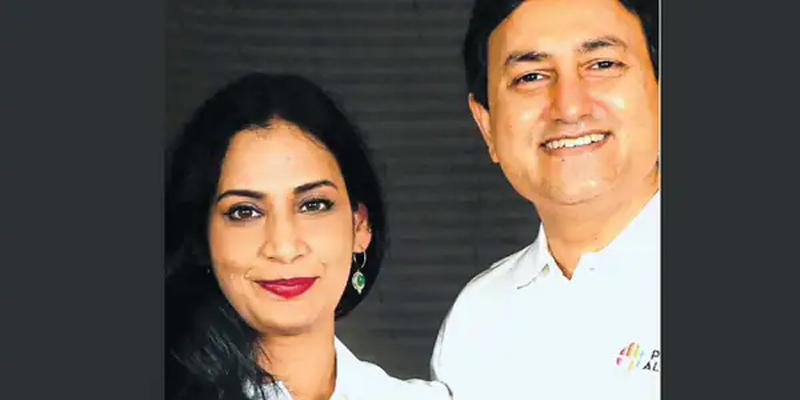- April 21, 2023
- Posted by: peakalpha2023
- Categories: Livemint, Uncategorized

Livemint article posted on 11 Jan 2023
It was in 2005 that Shyam Sunder and Priya Sunder started PeakAlpha Investment Services. There was a dearth of good financial advisers at that time. Most Indians were beginning to enjoy the benefits of economic liberalization and accumulating wealth. And, many were looking to grow their wealth. The couple exploited this opportunity to help people in achieving their financial goals. Cut to the present, the 18-year-old company provides services to 5,000 clients, including 1,000 families.
Mint talks with the couple to understand how they manage their clients money in this special series commemorating a decade of Sebi’s regulations for registered investment advisers, or RIAs (Mint has been speaking to advisers who have completed or are nearing a decade in the profession). Edited excerpts from an interview:
When did you register as an RIA? Describe your career before that.
Priya Sunder: We registered as RIAs in February 2017. Shyam and I studied abroad. I graduated from Northwestern University with a master’s degree. Shyam got his MBA from the Wharton Business School at the University of Pennsylvania. We worked for several years with different companies. In 2003, we moved back to India and two years later quit our jobs here to start PeakAlpha Investment Services.
What was the financial advisory landscape before the RIA regulations were brought in?
Shyam Sunder: I would say there were broadly three categories of people. One category comprised self-directed people who didn’t seek advice. I would say 90% of them were self-directed because of lack of awareness and the rest because they knew what they were doing. The second category got a lot of incidental advice about investment products from various intermediaries. And the third was a small group of holistic financial advisers and financial planners.
Who was your first client?
Priya Sunder: We started operations in April 2005. Our first client was a family member. We started by reaching out to family and friends. And then, simultaneously, we held workshops and in the process got many clients. We got our first client 18 years ago. He gave us our first investment cheque and continues to be our client today. Even in our first year, we would commit to meeting our clients every quarter, which meant that our advice had to stand the test of time. And it also meant that, whatever we chose to advise our customers, we would have to be able to defend ourselves in future reviews, be it three months or three years later.
How have things changed over the last 10 years?
Shyam Sunder: There is a greater level of affluence. Aspiration levels are higher now. Things that were considered luxuries in early years have in many cases become a necessity. People sending their children overseas for higher studies were in a minority then. In contrast, a majority of them want to do so now. Today, almost everyone is at least planning to structure their investment portfolios in such a way to make these things happen.
The mix of income has also changed. Earlier, people would have expenses that were deemed necessary. There’s a big change as you get wealthier. Discretionary expenses become a greater part of your overall expense pool. That includes spending more on travel and holidays with the family. People are allocating and planning to spend more money on better experiences. These are the broad changes we see in the households we talk to regarding expenses and desires.
What do you think of traditional and investment insurance plans, and endowments ?
Priya Sunder: We don’t recommend insurance. If it’s sold to someone who doesn’t need it, then it’s a problem. But if it’s sold to someone who needs it to save on taxes or for other reasons, then it is fine. So, I think it’s important in conversations to realize whether there is a need for new products. If the product was fundamentally bad, the regulation would have taken it off the shelves.
What has been your proudest memory of serving a client?
Priya Sunder: There is this particular case about a woman who was going through a divorce. She wanted to settle everything quickly because it was so stressful. She just wanted to move on with whatever was offered as a settlement. But, we went through the numbers to determine whether or not it was a fair settlement. We found it to be woefully inadequate, and that it wouldn’t last her for the next few years. We offered her a different set of numbers, which she shared with her lawyers and her husband. The final settlement was nearly seven times the amount that was originally proposed. I think that situation wouldn’t have happened without our intervention. I was very happy with the outcome and so was the client, and we made sure that she would be taken care of financially for the rest of her life.
Are there any regrets in something you recommended in good faith but was not happy with?
As for the regrets, I would say it pertained to credit risk funds. It started with the Amtek auto debacle in 2015. Then, in 2018, there was the IL&FS issue, and in 2019 there was the DHFL issue. These funds were giving good returns in 2014, 2015 and 2016. And they had a place in clients‘ portfolios with acceptable risk levels and return trade-offs. But, I think, after the ILFS crisis hit, there was one cascading effect and a domino effect. There was a liquidity crisis. There was one fund house which closed six schemes. For our clients and for us, it was very stressful and unpleasant to go through that whole situation in 2020.
What’s the hardest part of being an adviser?
Shyam Sunder: Often, there’s a gap between the advice offered and the action taken by the client. And that’s frustrating for any adviser. There is no point in giving advice if you don’t act on it.
What is the common financial mistake that investors make?
Shyam Sunder: Unfortunately, I think the client’s list of mistakes is quite long. In our opinion, one of the greatest mistakes they make is the misalignment between their actions and their own personal situation. For instance, where they need a term plan, they buy a more expensive variant of insurance, or buy cryptos when they need to invest safely. They build a totally conservative portfolio when they need to grow their portfolio meaningfully, leaving them at the risk of being penniless much earlier in their lives.
Do you take your own advice?
Priya Sunder: Yes. There are fundamental principles relating to asset allocation, diversification and making your money work hard for you. We do all these things because that’s what we’ve been doing for our clients. And we certainly apply those principles to our personal finances as well.
What reforms do you suggest, if any, for the RIA rules?
Shyam Sunder: We want to lead the charge in democratizing advice, making it available to everybody who needs it. Yet, the bar for advisers is quite high: They have to take the RIA exam once every three years. Our humble request is to allow us greater flexibility in terms of the employees that we can bring on board as advisers.
